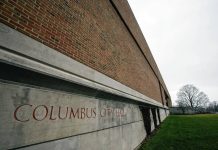Advance Columbus or three numbers: $17 million, 0 and 100 percent.
The two candidates vying for the Columbus Republican mayoral nomination debated the issues for 90 minutes Wednesday night, using those references.
Mayor Kristen Brown is staying the course with her Advance Columbus strategic plan for the city. Her challenger, Councilman Jim Lienhoop, used the numbers to demonstrate what he said must change in the next four years.
The candidates answered questions about topics such as education, Columbus as a welcoming community, the Religious Freedom Restoration Act, crime, The Crump Theatre and whether Columbus is living up to the vision that the late business and community leader J. Irwin Miller envisioned for the city.
About 400 people watched the debate at IUPUC, with an audience of about 200 in the university’s lecture hall, where the candidates each made their points in two-minute increments. The overflow crowd required others to watch and listen remotely, scattered in classrooms, the Summerville Room and the library. It also was live-streamed on IUPUC’s website.
Brown and Lienhoop shared their stands in softspoken fashion, conversational with the audience. They did not engage in debate with each other, however. Instead, they answered the questions without directly addressing each other.
Brown opened by talking about accomplishments of her administration, saying voters gave her the greatest honor of her lifetime by electing her as mayor.
Saying she was elected with a mandate for change, Brown said she made the tough calls to get the city’s fiscal house in order and brought a new transparency and openness to city government by dissolving Columbus Development Inc.
She listed the highlights of the Advance Columbus plan, which has been the city’s road map since her 2013 State of the City address, noting that the city has made record-breaking investments in street repair, the adoption of curbside recycling with no fees to city residents, blight elimination efforts and ambulance service improvements, among others. Brown said the city has increased its cash reserves, all without trash fees, without new taxes or adding new debt.
Lienhoop asked the audience to remember that the city has $17 million more in incremental tax money than during former mayor Fred Armstrong’s last term in office. He said the mayor has contributed zero to the revenue — that no new major employers have come to Columbus during her term, Lienhoop said. And the 100 percent — or nearly that — mentioned referred the turnover rate of city department heads since Brown took office, Lienhoop said.
“I believe the tone starts at the top,” Lienhoop said.
Education issues
Candidates were asked how they would increase educational attainment levels for Columbus residents.
Brown said priority one for the community is increasing Columbus’ workforce as the city is a net importer of workers — with as many as 11,000 people coming into Bartholomew County every day to fill jobs. The mayor said she hopes to use some tax increment financing money to invest in workforce development, to start providing workers with the skills that local employers need most.
Lienhoop said he would work with local education leaders to enhance the educational programs the area already has. Rather than training programs, which he said would be difficult to fund through city dollars, he would work with the school corporations and higher education to encourage students to stay in school.
A question about Columbus’ rejection of the 2014 referendum to provide prekindergarten education to Columbus’ neediest families drew different responses from the two candidates.
Lienhoop said he had the sign in his yard, wore the T-shirt and was all in for the pre-K initiative.
“I believe that educational attainment is the one single thing that a person can do to attain success,” he said. He said that private, faith-based preschools might be an alternative for some families, but that the end result of unprepared preschoolers is required remediation.
Brown said she believed pre-K was valuable and something that should be available to everyone in the community. Instead of a tax increase, Brown said she would have to be sure everything was being done to find money through efficiencies in spending.
Economic development
When asked whether too many of Columbus’ eggs are in one economic basket with Cummins Inc., by far the city’s largest employer, Lienhoop said the city’s economic options are a bit more diverse than that. He advocated moving into different kinds of manufacturing companies such as pharmaceuticals — or building something Columbus already has, higher education. Another possibility would be to look at health care companies as a growth opportunity, he said.
Brown said companies won’t come to Columbus without a workforce to meet their needs, and that means focusing on workforce development. She mentioned redevelopment plans for the State Street corridor in eastern Columbus and looking at a public-private partnership in Walesboro to develop shovel-ready sites for companies. A planning department study has pointed to where the city can grow in the most cost-effective way, she said.
Both candidates were also asked about how they would work with neighboring counties to further economic development in Columbus, something that Lienhoop said means talking to leaders there and getting to know them.
Lienhoop said he went on a Columbus Economic Development Board trip to Japan and China last fall with the mayors of Seymour and North Vernon, and learned a great deal on the trade mission about the two neighboring communities.
The state Legislature has economic development money specifically targeted to regions with leaders who work together, Lienhoop said, adding that spending the time to get to know them and work with them will result in economic benefits.
Brown said Columbus officials must look at economic development regionally, because of the number of people who are driving in to work in Columbus each day.
Welcoming community
The candidates were asked about their position on the Religious Freedom Restoration Act, legislation that some say allows businesses and organizations to discriminate against gay and lesbian residents.
The mayor said the legislation has been a state issue, and she was not well-versed in it. Saying there had been wide interpretations, and misinterpretations of the bill, Brown said it certainly had been viewed as bad for business.
Brown said she was an opponent of discrimination of any kind, treats everyone with the same degree of respect and serves everyone equally.
Lienhoop read from a prepared statement, saying he expected that question might be coming.
Referring to the creation of the Columbus Human Rights Commission 50 years ago, the first in the state, Lienhoop said it was dedicated to the proposition that all are created equal.
“Since then, we have worked to be a welcoming, diverse community. We don’t just say it. We work at it.”
Now, there is a law on the books that says to many in the country that in Indiana we will tolerate discrimination and that we won’t welcome diversity, Lienhoop said. He was assured by Sen. Greg Walker, R-Columbus, that bill didn’t say this, but nonetheless many think it does, he said.
“We simply can’t have discrimination in practice or perception,” he said. “We should treat all with civility and dignity.”
Lienhoop said he was urging state legislators to act quickly to make it clear that in Indiana, religious freedom, non-discrimination and tolerance can coexist.
Columbus’ future
Invoking the foresight of J. Irwin Miller, the students asked whether Columbus is on the right track for the future and what steps Columbus needed to take in the future.
Brown said she knew Miller, saying he had incredible vision. Mentioning the Advance Columbus plan as a vision for the community, she said Columbus now had bigger challenges that are now being addressed by public-private coalitions.
One of the biggest challenges is that the philanthropy is not what it was when Miller was alive, Brown said.
That means Columbus has to be extra cautious in how it invests its limited private and public money.
Lienhoop said the big, audacious goal that Columbus had 50 years ago, to be the best city of its size in the country, has, for the most part, been achieved.
But Miller also said the process is as important as the product, Lienhoop said, adding that how we work together is just as important as what is produced.
Lienhoop said there had been a little too much “my way or the highway” and not enough listening or taking into account the views of others.
[sc:pullout-title pullout-title=”The top three differences” ][sc:pullout-text-begin]
Each candidate was asked what are the three most important differences in their campaigns that voters should remember. This is how they responded.
Mayor Kristen Brown
1. My commitment to good government and fiscal responsibility.
2. I’ve been incredibly inclusive — we’re not calling the shots behind closed doors.
3. I am running on a record of success, accomplishment and results and not rhetoric. I’ve kept my promises and I’ve got a track record that I’m very proud of.
Jim Lienhoop
1. Jobs and economic development
2. Controlling spending, it’s about how we plan.
3. How we get along — the tone starts at the top. And one other place I would go, that is, respect for those who are less fortunate.
[sc:pullout-text-end][sc:pullout-title pullout-title=”The flash round” ][sc:pullout-text-begin]
At the end of the debate, the candidates were asked 10 questions, submitted by the public, and were asked to answer yes, no or pass. Here are the answers.
Q: Should city code on civil rights protection include sexual orientation and gender identity?
Lienhoop: Yes
Brown: Far too complex for yes or no
Q: Do you support school-age skilled trade development?
Brown: Yes
Lienhoop: Yes
Q: Do you support legalization of marijuana?
Lienhoop: No
Brown: No
Q: Will you encourage greater collaboration about issues affecting the needy?
Brown: Yes
Lienhoop: Yes
Q: Would a population of 100,000 be good for Columbus?
Brown: Pass
Lienhoop: No, not anytime soon
Q: Do you plan to keep property taxes from increasing?
Brown: Yes
Lienhoop: Yes
Q: Should the government own and rent out real estate:
Leinhoop: No
Brown: No
Q: Can something be done for those who live on 200S to ease traffic and create more options for travel and safety?
Brown: Sure
Lienhoop: Sure
Q: Is there a plan to extend Columbus transit to 9 p.m. Monday through Saturday and on Sundays?
Lienhoop: No
Brown: No
[sc:pullout-text-end][sc:pullout-title pullout-title=”Coming Friday” ][sc:pullout-text-begin]
The Republic is publishing daily primary election previews through Sunday. Coming Friday: Learn about Columbus City Council District 4 candidates.
[sc:pullout-text-end]




